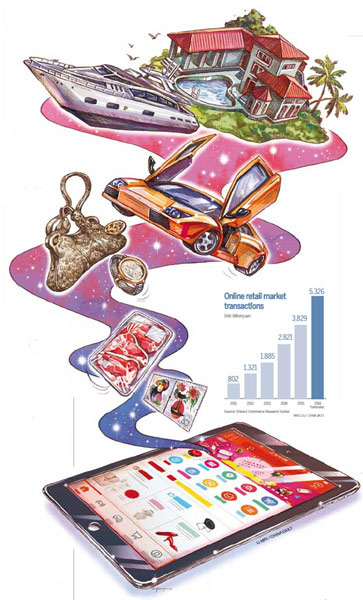Stamps, meat, cars & islands, too
By Meng Jing (China Daily) Updated: 2016-05-31 11:06E-commerce has had a huge flow-on effect in China's economy and society
Staying in the good graces of butchers was a matter of survival in China in the early 1980s, for it was they who decreed who among their customers got the best cuts.
"Fatty meat was at the top of everyone's shopping list because people were so desperate to get some oil," says Jiang Meifeng, 58, of Xi'an, Shaanxi province.
Those were the days when there was a strict rationing system, shoppers being required to buy food and other daily necessities with coupons.
"Even if you had a bit of money it was slim pickings because everything was in such short supply," Jiang says.
Compare that with today, when the range of choice seems almost limitless, particularly as e-commerce continues to revolutionize the way people go about their everyday business.
Jiang, who is now retired, can, smartphone in hand, order whatever meat - domestic or imported - she desires from an overflowing pool of goods online. Not only that, but the curt take-it-or-leave-it butcher and his ilk have been replaced by cyber salespeople who are wont to address her as "dear" and send out all manner of jovial emoji to keep her loyal.
As China's retail industry has modernized it has gone through various reincarnations, the most notable being individual stores turning into chain stores and department stores turning into shopping malls. However, for James Roy, principal at China Market Research Group, the most remarkable change has occurred in the past five years: the arrival of e-commerce and its hearty embrace by hundreds of millions of Chinese.
"It is a completely disruptive change as e-commerce provides constant access to a limitless choice of goods while a brick-and-mortar store is constrained by its opening hours and location - which means it can only cover a certain radius - and its shelf space," says the Shanghai-based Roy, who has been a specialist researcher of China's retail industry for 10 years.
Taobao is the supreme example. The online marketplace run by Chinese e-commerce giant Alibaba Group sells everything from stamps to furniture, and from cars to overseas islands. And it is not only those in big cities who can enjoy shopping online, but also those in small villages. In fact, even as you read this, folks who work for the e-commerce major JD.com are likely to be working on drone delivery technology that they hope will help those in rural areas receive purchases faster.
At the heart of the online sales surge in China are the seemingly boundless range of goods and the internet technology that puts it all within ready grasp of buyers. As with anything to do with the internet in China, the numbers are apt to set your head spinning. In just five years the value of online shopping in the country has grown nearly five-fold, to 3.83 trillion yuan ($587.5 billion), last year, the China E-Commerce Research Center said in a report published a fortnight ago.
As many as 460 million Chinese shopped online last year, the center in Hangzhou said, and their spending accounted for 12.7 percent of overall retail transactions in China, almost triple the figure four years ago.
- Premier Li calls for passion in S&T innovation
- China to check halal food
- Action plan targets soil pollution
- Sexually abusive guardians must lose rights, top court reiterates
- Xi, Li see science as key to future
- Satellite industry raises sights-at least 100 'by 2020'
- China 'to press US' on maritime issues
- Media 'can help to defuse' conflicts
- Reaction mixed to new paid leave rule for single children
- Construction of new airport takes off in Chengdu








